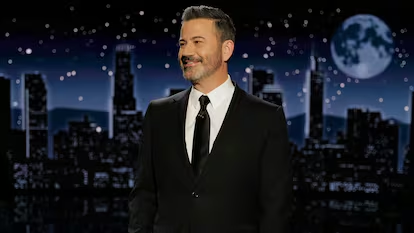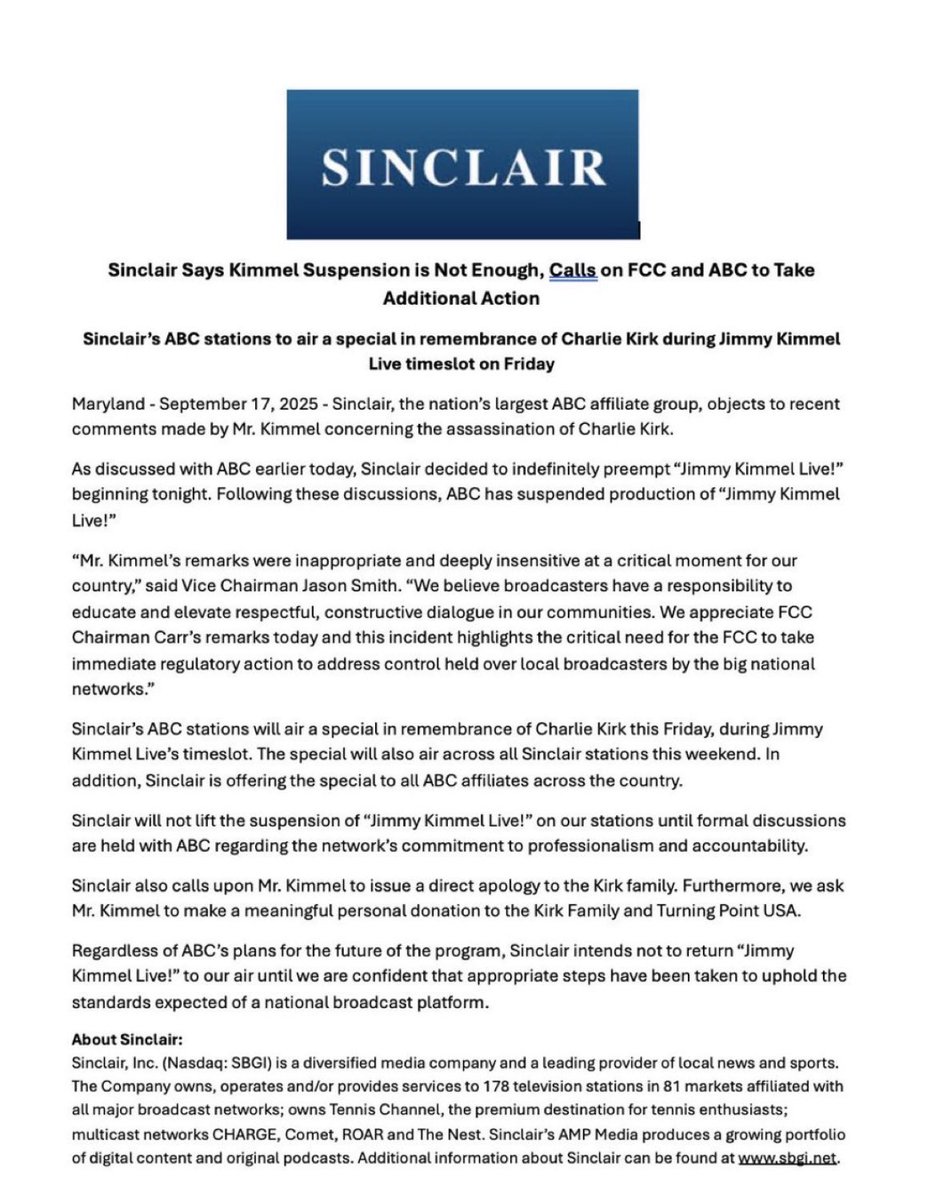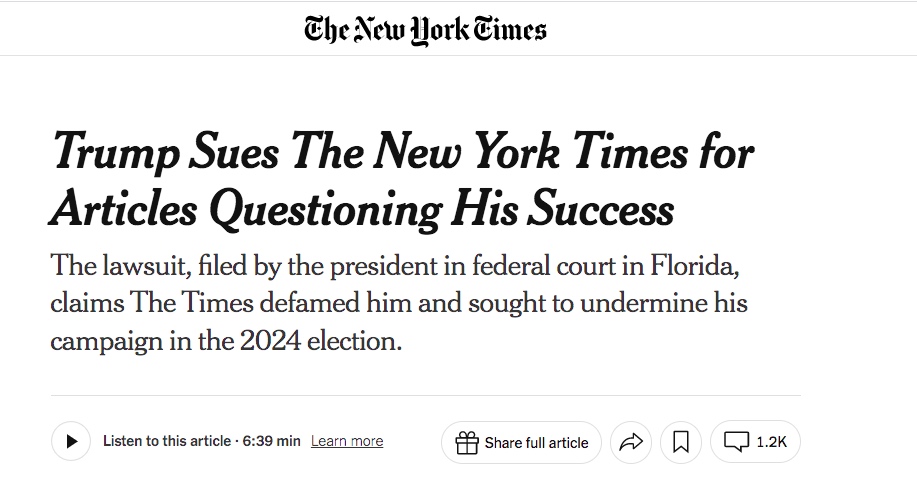The loss of free speech in America signaled by Jimmy Kimmel’s suspension has been ushered in by big media companies who refuse to defend their employees.

Yesterday, I was addressing a classful of students at Duke University via Zoom. We were talking about the crackdown on those who commented about Charlie Kirk’s murder, and one of them asked me what was the biggest challenge about trying to report and comment on these times.
I answered: Owners of big media companies who refused to stand behind their employees, often hard working journalists and pundits, trying to get at the truth of a fast-moving, important story.
I had no idea how prophetic my words would be.
To hear that ABC has “indefinitely” suspended Jimmy Kimmel Live! because the host uttered an irreverent line about the MAGA movement and the alleged shooter of Charlie Kirk, felt like the ultimate capitulation of corporate media to a conservative mob.
For the record, here’s what he said: ““We hit some new lows over the weekend with the MAGA gang desperately trying to characterize this kid who murdered Charlie Kirk as anything other than one of them, and doing everything they can to score political points from it.”
Satire with a pointed opinion for sure. But worthy of a suspension? Hardly.
And it wasn’t just Disney-owned ABC that was culpable. Reportedly, Nexstar corporation — a corporation which owns nearly 200 TV stations across the U.S. and is seeking government approval to merge with another giant local television station owner, Tegna – announced it would “preempt Jimmy Kimmel Live! for the foreseeable future” on its ABC affiliated stations over his one line.
Not long after that, ABC announced Kimmel’s suspension.
(According to the New York Times, “The decision to suspend “Jimmy Kimmel Live” was made by Robert A. Iger, Disney’s chief executive, and Dana Walden, the company’s television chief, according to two people with knowledge of the matter.”)

Even now, Sinclair Broadcast Group, another company which also owns nearly 180 stations in 81 markets – and has been the subject of reporting alleging it advances coverage and commentary which aligns with Donald Trump’s political vision — is demanding Kimmel personally apologize and make “a meaningful personal donation to the Kirk Family and Turning Point USA.”
For making a joke.
It should go without saying that this is more than a bizarrely brutal capitulation to the political agenda of the Trump administration and the MAGA movement. Given that Federal Communications Commission chairman Brendan Carr threatened to go directly after Kimmel and ABC before the network made its moves, it’s also an example of the government leveraging its regulatory power to silence critics of the president and the party which controls the White House.
But more than anything, it is an abdication of the responsibility media owners have to support democracy by defending their employees right to freedom from having their speech policed by politicians who control the government.
This isn’t something that I should have to write in a column. This is something executives who own dozens of TV stations should know in their bones. It’s something they should have plastered on their walls as a mission statement.
We do not collude with politicians in government to stifle the speech of those who criticize the government or the political movements which support the government.
Sadly, Kimmel’s “suspension” is in line with what we’ve seen in other corners of big media, where columnists and pundits like Karen Attiah and Matthew Dowd have been fired by the Washington Post and MSNBC, respectively, for commentary that didn’t seem to warrant such a strong punishment.
But both MSNBC and the Post are owned by companies and individuals who need things from the federal government. So, perhaps they reasoned it was easier to get rid of people who might spark the Trump administration’s ire than stand up for the principle of allowing people the freedom to say important – if sometimes disquieting – ideas.
And here’s the thing about trying to appease bullies, especially in government: Giving in only leads to more demands.
Disney’s decision to settle a lawsuit brought by President Trump that it might have successfully fought set a pattern. It also settled a wrongful termination lawsuit filed by a Trump supporter, Gina Carano. Now it’s wound up sidelining a comic and host who was at the center of its network for more than 20 years.
Same with CBS owner Paramount settling a lawsuit from Trump over editing of an interview for 60 Minutes that seemed to be within the standards of journalism practices. Now, they have agreed not to edit interviews with newsmakers done for CBS’ politics show, Face the Nation, making it even tougher to factcheck politicians and keep statements which aren’t true from being featured in their program.

Now Trump has sued the New York Times for $15 billion over issues which are considered typical journalism efforts — including reporting critically on his finances, alleging he built his fortune in part through fraud, and quoting a critic who said the president met the definition of fascist. If newspapers don’t have a right to speak critically about the president — and air the views of others who are critical — who will?
Carr appeared with Fox News Channel host Sean Hannity to claim that broadcasters who suspended Kimmel’s show were acting in their “public interest obligation.” But one of the most important elements of that obligation is to protect the speech of those who disagree with the government. Indeed, that should be one of Carr’s most important obligations.
Instead, he seems focused on punishing those who dare to say things the president or his supporters find objectionable. And the powerful, well-paid executives who control the country’s biggest media companies have fallen in line, pretending that sidelining a TV host for daring to crack an irreverent line about the MAGA movement somehow protects the public, ignoring their duty to protect their employees.
Once upon a time, conservatives feared a world where the government cracked down on speech critical of the government. They feared a world where government agents could pull people off the streets based on their appearance and ask them for papers. They feared a world where government agencies were weaponized to persecute enemies of the president, regardless of whether they had actually done anything worthy of such scrutiny.
But now that their political opponents are on the receiving end of this treatment, there seems to be much less concern in conservative quarters for what this nation is becoming.
A reporter on MSNBC noted that conservatives are calling the effort to crack down on Charlie Kirk critics “consequence culture” instead of “cancel culture” — appropriating the language of liberal activists who often used the term in speaking about how the #metoo movement sought accountability from powerful men who harassed and assaulted women.
But there’s an important difference here: In this case, the pursuit of consequences fits neatly into the ideological goals of government leaders like Carr, Vice President JD Vance and President Trump, who are using their powers as elected and appointed officials — tasked with serving everyone in America — to force negative consequences on people, simply for opposing them politically and insulting them publicly.
I have no idea what Kimmel may do next. When I interviewed him in 2023 for NPR, he seemed a little ambivalent about staying in the job even then, admitting that he considered quitting in 2022 before agreeing to a contract extension that may be winding up soon, anyway.
“I think it’s always comforting to hear that somebody else is going through something that you are going through,” he told me then. “I hear from people who don’t like me talking about Donald Trump [critically]. But I hear from a lot more people who do like to hear it, and who do appreciate somebody reminding them…that this is not normal and we don’t necessarily need to accept it.”
Kimmel initially seemed an unlikely Trump critic – a performer who was often something of an apolitical everyman, seemingly driven by his own sense of decency to stand up to a politician he felt was corrupting important American institutions.
And with his voice silenced, he might become something even more unlikely: A poster child for the diminishing speech allowed by big companies afraid of incurring the wrath of the president and the government he controls.